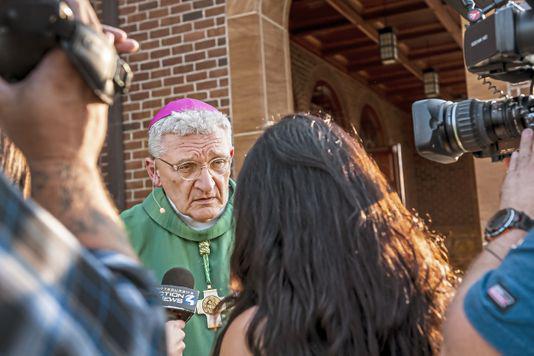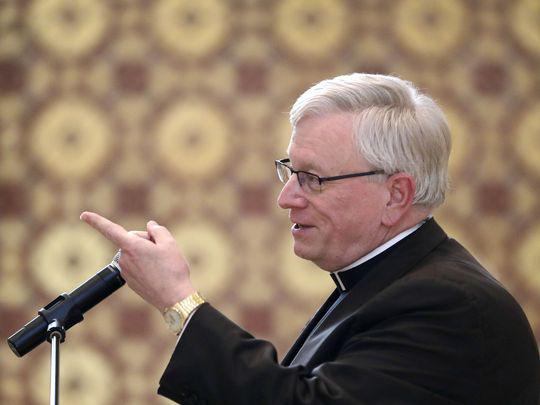|
David Zubik, former Green Bay bishop, under fire over Pennsylvania abuse cases
By Paul Srubas
David Zubik, the former bishop of the Green Bay Catholic Diocese, has found himself at center stage this week in a three-decades-old scandal about priest sexual abuse in his current diocese in Pittsburgh. Zubik has been leader of the Pittsburgh diocese since 2007. It is one of several named by a Pennsylvania grand jury as being part of a statewide scandal involving more than 300 predator priests who left more than 1,000 young victims over the last several decades. While nearly all the abuse cases referenced in the grand jury's report predate Zubik’s term as bishop, he was administrative secretary to the bishop and director of clergy personnel through part of the period and held other important administrative functions. The grand jury report indicates Zubik was probably aware of at least some of the steps the diocese took to keep adverse publicity to a minimum during the years the abuses came to light, including reassigning suspected abusers to other parishes or dioceses and reaching settlements with victims that included confidentiality agreements. Many of the abuses described in the grand jury report were addressed in the 1980 and early 1990s, when Cardinal Anthony Bevilacqua and, later, Cardinal Donald Wuerl, led the Pittsburgh diocese, while Zubik had administrative positions. Zubik was not in a position of authority but would have been aware of what was going on when the diocese chose to re-assign or issue letters of good standing on behalf of some of the priests accused of sexual abuse of minors, according to the report. In one case, Zubik wrote a confidential memo to Wuerl itemizing one abuser’s various assignments and sexual abuse allegations over the years, the report says. “You should know that these last three pieces of correspondence were placed in the confidential files,” Zubik wrote Wuerl in one case. Some of the old cases only surfaced after 2007, after Zubik had left his position in Green Bay and assumed the top spot in the Pittsburgh diocese. Although the report showed the diocese actively working in following years to get accused priests defrocked and provide financial compensation to victims, it cut off paying for one man’s mental health treatment two months before he ended up committing suicide, according to the report. The Survivors Network of those Abused by Priests, also known as SNAP, last week called for Zubik to resign after claiming he contributed to a cover-up of priests’ transgressions in the state over the years. Zubik has publicly acknowledged the Pittsburgh diocese, like many throughout the world, had its issues decades ago, but he denied there was a cover-up under his watch or under that of Wuerl, his predecessor. Zubik told ABC’s George Stephanopoulos last week that “the church of Pittsburgh today is not the church that’s described in the grand jury” report. He said the diocese has followed all steps needed to be responsible to the victims, and that it has developed tough policies against abuse, including development of an independent board to review allegations, assigning a specialist to work with victims and referring cases to prosecutors. Zubik posted a letter to Catholics throughout his diocese to explain the policies and practices implemented to prevent abuse. He assured members of the diocese no priest or deacon was in the ministry “against whom there has been a substantiated allegation of child sexual abuse.” Every allegation regardless of age is immediately turned over to prosecutors, Zubik wrote. Zubik told the Pittsburgh Post-Gazette that the diocese no longer enforces confidentiality agreements it reached or reaches with abuse victims. “We learn from the past,” he told the newspaper. “It’s an evolving understanding.” Zubik in Green BayWhen he was still bishop in Green Bay, Zubik had publicly apologized for the transgressions of priests who were charged criminally with abuse, including John Feeney in Outagamie County. However, he also angered members of SNAP by declining to identify the names of all priests accused of abuse, and SNAP accused him of ordering the destruction of old personnel files that might have helped bring some closure to victims. The diocese denied the accusation, saying it cooperates with victims of sex abuse and was following its well-established records management policies. The diocese’s administrative director said the records destruction involved only those of priests who had been dead for a year or more. In 2004, Zubik defended the diocese policy of keeping the priests’ names confidential if they were not charged criminally or if they were dead. He argued that, while he favors transparency, “it’s equally important to protect the rights of those who are falsely accused or those who have died and are not able to come to their own defense.” He said the diocese had made the names of clergy accused of sexual misconduct available to civil authorities. A study of the Green Bay diocese released when Zubik was bishop here showed 59 people had made allegations of sexual abuse against 35 priests over the previous 52 years. Of those 35, 15 were dead, 15 quit or were removed from their ministry, four were removed entirely from the priesthood, and one was charged criminally. The diocese paid about $1.36 million for victims. Bishop Ricken reactionGreen Bay's current diocesan leader, Bishop David Ricken, who replaced Zubik in 2007, took steps this week to assure northeastern Wisconsin Catholics that the local diocese is doing everything possible to keep their children safe from predator priests. Ricken posted an open letter on the diocese website to his “brothers and sisters in Christ.” “I am writing to you today with a very, very heavy heart regarding the recent public accusations about Archbishop Theodore McCarrick, and the release of the grand jury report from the state of Pennsylvania,” Ricken wrote. “These reports sicken me and leave me with a deep sense of anger and shame for what has been inflicted on the people of God in the past by certain shepherds of the flock, both the direct offenders against children and the purported cover up engaged in by some bishops.” His letter goes on to describe how he has listened to similar accusations from many victims “and walked with them as they courageously engage in the healing process.” It also describes the diocese’s Independent Review Board, comprised mostly of professional laypeople, set up to review accusations and processes of dealing with accusations of sexual abuse of minors by church staff.
|
.
Any original material on these pages is copyright © BishopAccountability.org 2004. Reproduce freely with attribution.

